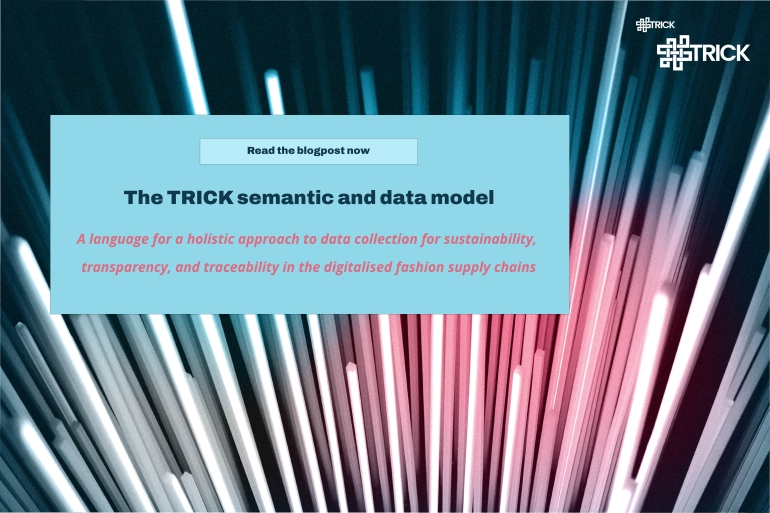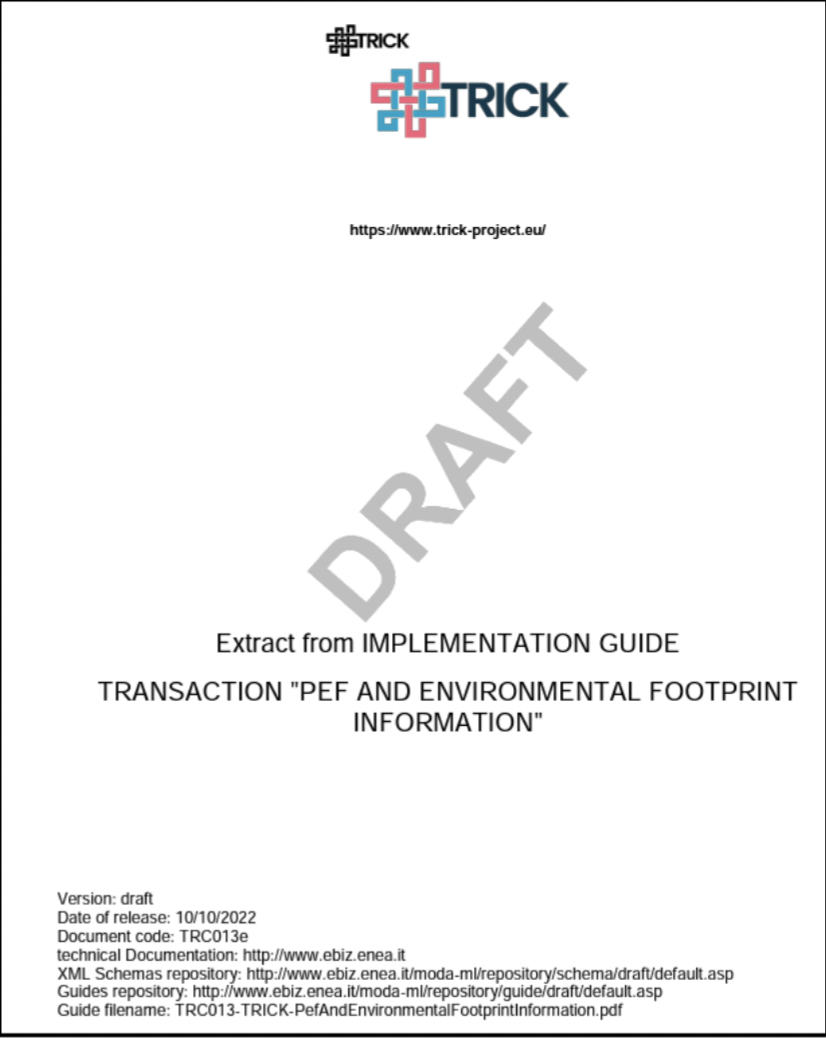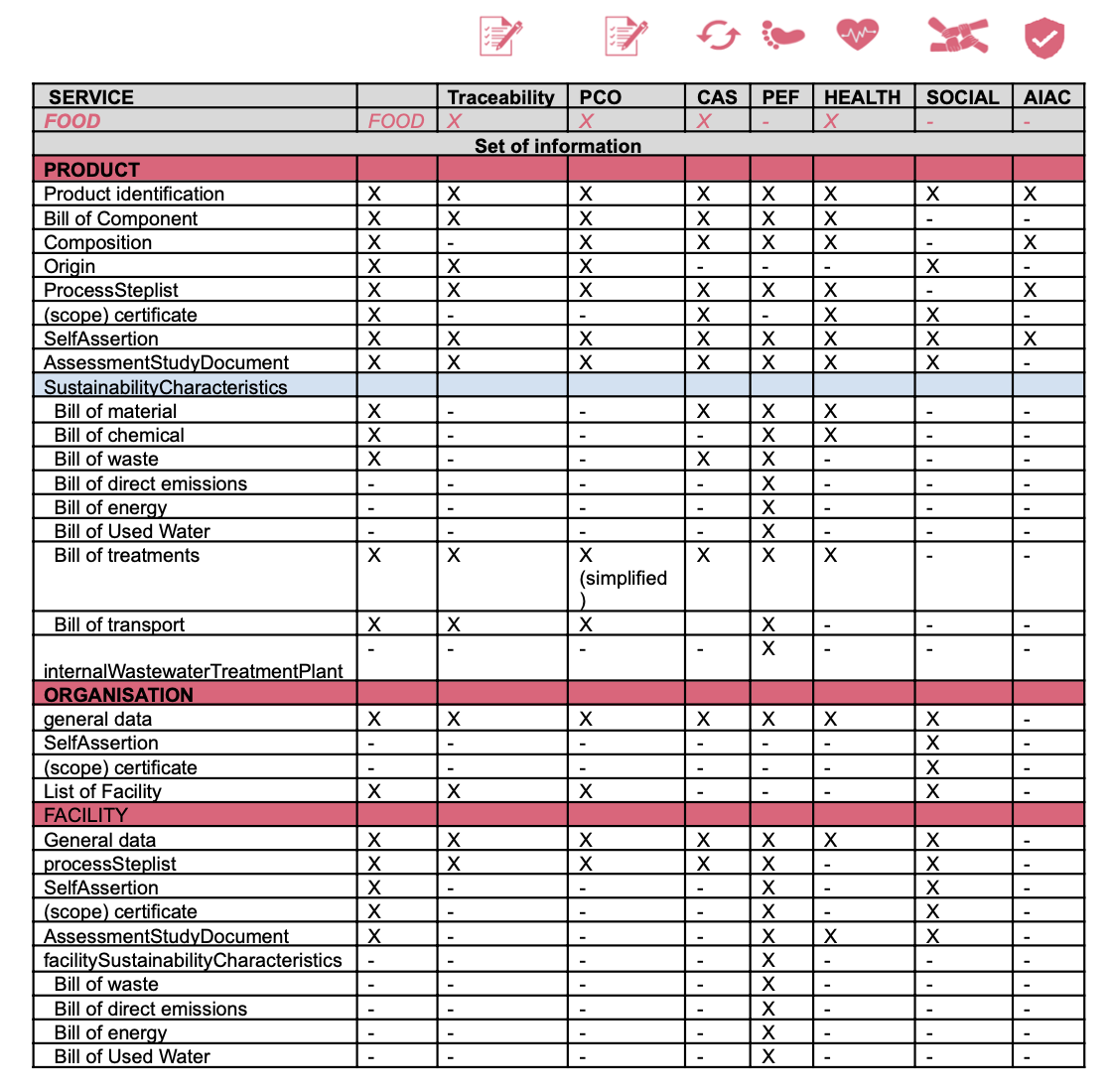The TRICK Semantic and Data Model: A Language for an Holistic Approach to Data Collection

One of the challenges for the TRICK project is supporting data collection for sustainability, circularity, and traceability, and related claims with faithful pieces of evidence, at small costs (also from the organisational point of view) and with reduced risk of blameworthy behaviours in the supply chain. From a longer perspective, the project aims at matching the requirements arising from the incoming Extended Producer Responsibility for the product.
For this purpose, the Data Model delivered by the project adopted a holistic approach to collect all the primary data and indicators related to product traceability, sustainability, and circularity and to make them available to different services.
As a part of these challenges, the adoption of «objective» indicators and primary data collection is a promising approach: indicators like PEF are expected to play an increasing role in market access on both sides of normative and customers’ expectations. The same for circularity and other kinds of sustainability assessment methodologies that need for synthetic indicators in order to represent products' performance and quality.
Relationship with standardisation
Existing standardisation initiatives and resources have been taken into account because they are very relevant for the creation of a collaborative ecosystem of actors and interoperable technological solutions: UNECE UN/CEFACT, GS1 XML and EPCIS, CEN CWA 16667 eBIZ, PEFCRs for apparel products and a number of other standards and nomenclatures, like TARIC (for Customs classifications of the product) or EWC (European Waste code), and many others.
The need for an implementation method to be used to achieve traceability, according to UNCEFACT proposed methodology, led to reliance on the collection of transaction documents such as orders, dispatch advices, invoices, etc.) produced in the daily business, plus extended technical information sheets (for sustainability information, for example). These documents are currently expressed on the eBIZ sectorial language and ontology and supported by a “Document Factory” that allows to maintain, improve and publish semantics, data structures and supporting User Guides and artefacts (like XML Schema and JSON Schema). Improvements to the eBIZ specifications were required in order to support the new requirements, for example for sustainability and circularity.

Image Credits:ENEA
The TRICK approach to sustainability and transparency
To answer some main criticalities in the collection of data for sustainability and transparency, the TRICK project
- privileges the collection of primary data from the field with a holistic approach to data modeling designed for their reuse by different services (Circular, Health protection, Social and Ethical assessments, PEF, Preferential Origin Certifications)
- overcomes the suppliers and subcontractors reluctance to fully disclose internal data by implementing policies to a mix between disclosure of indicators and footprinting on blockchain all the original data.
- proposes a set of public DATA MODELs based on the eBIZ dictionary (see eBIZ)
The project proposes a ‘Transparency and Sustainability Report’ as the core of the Transparency and Sustainability data collection. It collects all the available non-operational data about Product and Organisation and shares the data groups related to sustainability with specific schemas dedicated to each service.

Image Credits:ENEA
Traceability of final products and components from daily operations
The approach of TRICK to traceability assumes that daily operations generate evidence that can contribute to support both marketing claims (i.e. territory of origin) as well as legal claims (‘made in’ and preferential origin certificates).
The ordinary operations can become the source of evidence whose faithfulness is assured by the existence of third parties in charge of controls: it is the case, for example, of the e-CMR (electronic road waybill) that is expected to be checked by public authorities and that could be used to confirm physical goods movements.
In the TRICK picture, supply chain digitisation is a fuel for traceability and vice versa, the need for goods tracing promote digitisation of the supply chain actors.
The final solution proposed is an Enriched Event model in order to collect events from a wide variety of different systems, based on a proposed extension of the eBIZ dictionary. This solution could be easily mapped into EPCIS and UNECE event models with a small loss of information related to a plurality of product identification methods and a detailed process step description.
The Traceability Report is the core of the traceability data collection: it collects the history of a lot of a final product and the history about its components. This document will also be experienced in the dialogue with the Custom Agencies in order to collect documentation to be linked to the Custom Declaration when the exporter asks for the Preferential Certificate of Origin.

Image Credits:ENEA
An outlook towards the digital product passport (DPP)
Conclusion
As a consequence of the spent effort, we can report the following meaningful figures as a measure of the improvement provided by TRICK to the whole eBIZ specifications:
- 14 new eBusiness documents added to the eBIZ specification for Upstream Textile Production¹
- 244 new terms and data structures added to the existing eBIZ dictionary and ontology
- 32 new tables with 565 new codes added to the existing eBIZ ontology
This is a relevant contribution to the eBIZ specification and might lead to a proposal for the release of a new version.
They can be found here.

To read the full deliverables of D2.2, please visit TRICK documents on our website: link
REFERENCES:
- ¹ published on https://www.ebiz-tcf.eu (and previously in CEN CWA 16667
CONTACT PERSON & EMAIL ADDRESS:
LINKS:
- Website (link)